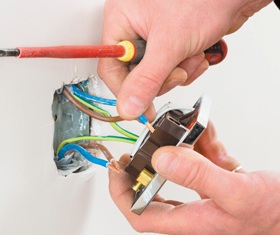
We use it every day and take it very much for granted but how often do we assess the risks when it comes to electricity? You can’t see it, you can’t smell it but you’ll certainly feel it and it can be the cause of many serious accidents around your home. It’s the current that’s the problem and just a small amount can be enough to kill you. The amount and type of current is the danger, with AC (alternating current) being particularly deadly. Electricity is all around us and we make use of it throughout the day. The number of electrical appliances, gadgets and equipment we use is increasing and there seems no end to our need for their assistance in our normal routine. Therefore it’s increasingly important to give this electrical equipment the respect and care it deserves. Follow the tips we’re going to share with you and you’ll avoid painful electrocution.
- Use the services of a qualified electrician whenever possible, especially when installing power points and new light fittings or rewiring electrical appliances. Only a professional has been expertly trained and knows what they’re doing.
- Use a safety switch or RCD (residual current device). This system automatically and swiftly cuts off the current if a fault is detected in the power supply or the equipment it is connected to. Some properties will already have one installed but if not then purchase one from a high street store and fit it between the appliance and the power outlet it’s plugged in to.
- Keep a close eye on the power cords or extension cables you’re using. Look for cracks or splits in the insulation that protects the cable and the plugs aren’t loose or have exposed wires. If you have electrical equipment that is rarely used then check these things every time you go to use them. Needless to say, if you find a fault contact your local electrician and get them to come and replace the wiring.
- Have a qualified person inspect and test your electrical equipment on a regular basis. This will ensure it continues to be safe to use.
- Another pretty obvious tip, but worth repeating none the less, is not to use electrical equipment where they’re likely to get wet. This doesn’t apply to washing machines and dishwashers as they’re designed to deal with water. Should you be unfortunate enough to get something wet have it checked out before using it again.
- Don’t overload your power outlets by plugging in too many appliances.
- Make sure you’re aware of any overhead or buried power cables and avoid them when doing work on your home.
- When using an extension cable don’t run it across the floor or on the ground but suspend it out of harm’s way.
Contact with a power supply doesn’t allow for any second chances so it’s important you understand how electricity works. Follow our tips and you’ll be maximising your protection and that of your family.
Shared by electriciansinlondonanduk.co.uk







